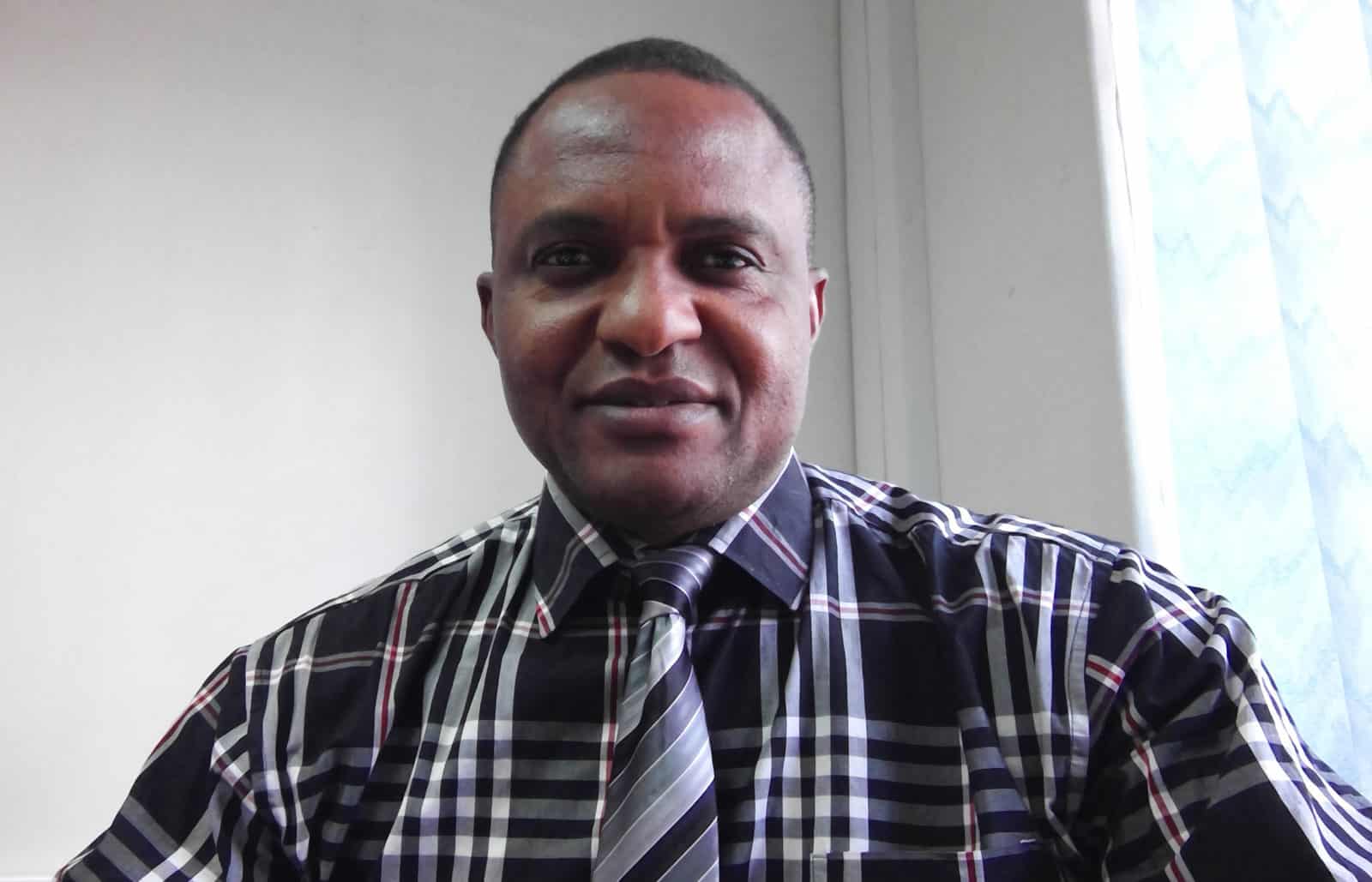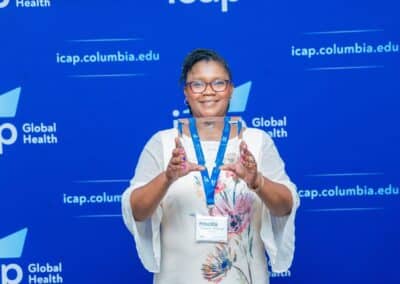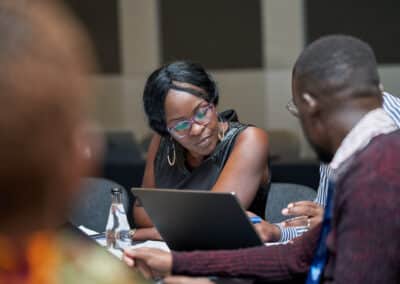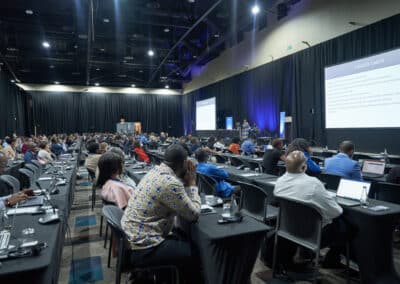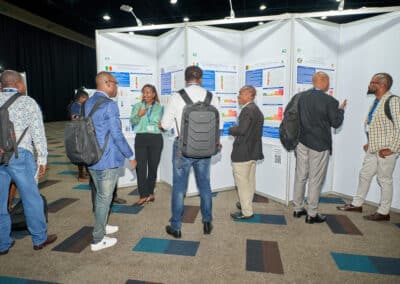Michael Odo, MB BCH, MSc, MPH, is the technical advisor for HIV care and treatment for the Department of HIV/AIDS, at the Malawi Ministry of Health. At CQUIN’s Science and Practice of Scale-up Workshop, Dr. Odo discussed Malawi’s successes reaching 90-90-90, the challenges ahead, and how CQUIN is helping the Ministry make the leap toward community-based care and treatment.
Dr. Odo recently presented a webinar on differentiated service delivery (DSD) for urban populations. He focused on Drop-in Centers, a DSD model that aims to reduce disease transmission and increase retention in care by accommodating the social challenges that female sex workers face when accessing prevention, care, treatment, and support services.
What is your role and how does it relate to DSD?
MO: My primary role is supporting HIV care and treatment in Malawi. This includes the entire continuum of care, from prevention and helping people know their HIV status, to assisting those living with HIV by getting them on antiretroviral therapy (ART), and ensuring those on treatment are virally suppressed. The continuum of care goes hand-in-hand with DSD; it’s the technical work of dividing service delivery for people living with HIV (PLHIV) who are stable or at high risk of disease progression.
Why is DSD important in Malawi and how will it help you achieve the 90-90-90 targets?
MO: Malawi is on the path to reaching the 90-90-90 targets. With routine quarterly program data, linked to spectrum estimates and the MPHIA survey, we’re around 90 percent for the first 90 (knowledge of HIV status), 80 percent for the second 90 (known HIV status starting ART) and 88 percent for the third 90 (viral suppression). We have about 1.1 million people living with HIV, and the 2018 spectrum estimates puts the HIV prevalence among adult population at 9.7 percent. The incidence is declining across all age groups. Malawi led the world in option B+, so we have many pregnant women doing very well and mother-to-child transmission has reduced significantly.
We are happy to have more people doing well on HIV treatment and living longer healthy lives. However, the ageing PLHIV population comes with its own challenges; there’s tremendous pressure on the health system. The clinics are pretty congested, and health workers have to deal with much higher workload that threatens the quality of care.
Clinical care for PLHIV and those who are HIV negative and needing health service for other areas of concern is of great interest to the government, and this is where DSD comes in. Right now, we have a strong focus on DSD in clinical systems for those patients on treatment who are virally suppressed. We’ve demonstrated pilots that show feasibility and acceptability, and have related them to cost-effectiveness and efficiency in the system. We’ve also shown effectiveness of our teen club model and demonstration projects for key populations. There is however, a lot of room for improvement in scaling-up DSD in Malawi.
How has your participation in CQUIN and the south-to-south exchanges benefited you and your colleagues at MOH?
MO: Malawi is very happy to be part of the CQUIN learning network. CQUIN provides a very useful platform to learn from other countries, benchmark practices and learn on how challenges are addressed within country context. The workshops and field visits are helpful because we’re able to see interventions that are feasible and provide experiences to inform policy in a broader dimension. We’ve been able to make the concept of DSD mainstream here in Malawi, and include different types of DSD in the current 2018 HIV treatment guidelines.
Malawi’s participation in the CQUIN-supported quality improvement (QI) workshop in South Africa triggered the Ministry’s implementation of a viral load scale-up QI collaborative project in the Balaka district of Malawi, leading to a scale-up of viral load coverage in the participating facilities to over 95 percent. These successes have galvanized us to start rallying our partners to scale-up the QI intervention as we push to achieve the second and third 90s.
For our current south-to-south visit to Eswatini, we came as a team – colleagues from MOH, community support organizations, and PEPFAR. We saw that community-outreach clinics supported by trained ART providers is possible. We had some genuine concerns about the rollout of community ART under the surveillance of lay expert-clients and issues of co-morbidity and difficulties with TB screening among PLHIV in the community. This visit showed us that when you have a health worker providing leadership in the community, community ART groups works very well.
That adds value to our discussions on nurse-led community ART groups. We look forward to scaling-up community ART here in Malawi. It may vary a bit from the regular community-ART that is just led by expert-clients who are not health providers, but it’s a gradual way of getting into the full community system. We’re working more closely with civil society, so we’ll be involving them more with ART-service delivery within community systems. That should result in better uptake and demand from civil-society to compliment the role of the health system.
What are some of the biggest challenges when it comes to scaling-up DSD?
MO: We didn’t have an enabling policy framework before. We have strong MOH leadership, and now our technical working group has evolved a good DSD framework that’s enshrined in the treatment guidelines and endorsed by MOH. This policy framework positions us for scale-up. The next challenge is ensuring we have the resources for effective scale-up, which will come with lots of sensitization and training. This is a priority, because even though our supply-chain system is very robust and we ensure every patient that gets to the clinic gets their medicine, it doesn’t take away the discomfort of the long waiting times or the pressure on health workers.
We’ll absolutely require resources as we scale-up DSD and decentralize clinics to the community. We’ll need an experienced ART-provider available to supervise the ART service in the community and ensure M&E is linked with our national system. We’ll need to carefully monitor scale-up so that the success we’ve achieved is not compromised in any way.
How can CQUIN assist you and your colleagues to scale-up DSD in Malawi?
MO: CQUIN breaks down boundaries and enhances learning with experience-sharing and co-creation. Colleagues are sharing all of the challenges they faced in implementing DSD, and what led to their successes or failures. This gives us an advantage as we try to enhance DSD in our country. It’s also an opportunity to benchmark what we’ve done and improve.
The south-to-south exchanges have really helped us strengthen what we’re already doing well. For instance, many countries have come to see our teen-club model, and have given us good feedback. We also see from others what works well. It’s mutually beneficial.
I think that we’re already seeing the impact of this network. People who understand national HIV programs know the value of co-creation and networks. We’ve had our own experiences shared on the urban-DSD webinar, and we had such a dynamic discussion and follow-up questions. The dynamics of the HIV epidemic and programming really demand that this learning network exists and is sustained.
Learn more about DSD in Malawi.
This interview is part of the series: Perspectives on differentiated service delivery, exploring expert views and insights into the importance of DSD in sub-Saharan Africa, and the unique challenges they face in advancing services for people living with HIV. For more updates on this series, and other network activities, sign up for our newsletter monthly newsletter.


